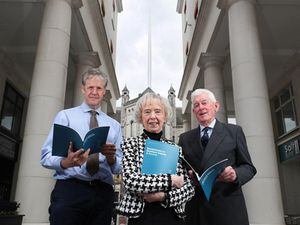New Stormont department to tackle sectarianism – report urges
The academic study by Ulster University has called for greater focus on the issue at executive level.

A new government department should be created in Northern Ireland to specifically deal with tackling sectarianism, an academic report has urged.
Ending the scourge of religious bigotry should top any future executive’s priority list and must be given the same political focus as other key policy areas, such as economic development, the Ulster University study recommended.
Progress can be better monitored if an accountable department takes ownership of the issue, the report said.
As well as the executive department, the academic review also proposes establishing a new civic body to help shape community efforts toward reconciliation.
The report also recommends setting up a fund to enable businesses to sponsor cross-community projects.

The study, which was commissioned by the Sir George Quigley Fund, also proposes the creation of a Youth Assembly to give young people a voice and says consideration should be given to lowering the voting age to 16.
Penned by UU professor Duncan Morrow, the report does not suggest how the new executive department would be structured and whether the ministry would be allocated under the conventional d’hondt process or, like the Stormont justice department, be filled by a politician that does not belong to either of the two main parties, the DUP and Sinn Fein.
The proposals will be considered at a special conference in Belfast on Tuesday which will be addressed by a range of high-profile guests, including the US diplomat that brokered the Good Friday Agreement, Senator George Mitchell.
Comedian Patrick Kielty, whose father was murdered during the Troubles, will also speak at the event.
Politicians have been invited to attend, as have church, business and community leaders. Young people from across Northern Ireland will also join the audience at the UU’s Belfast campus.

The report launch comes amid renewed efforts at Stormont to restore the powersharing institutions after more than two years without a functioning government.
Professor Morrow said the recent murder of journalist Lyra McKee in Londonderry should focus minds on the need to act.
“The deeply tragic events of recent weeks sharpen the focus on just how dangerously close we remain to this residual threat,” he said.
“The young people taking part reflect the hope and optimism that we all hold for Northern Ireland, but we have a duty of care and leadership to ensure that the expectation, aspiration and potential of the next and future generations is met and not stifled by sectarian polarisation. We hope that the review’s recommendations will make possible the step change needed.”
The Sir George Quigley Fund was set up by the Ulster Bank in honour of its former chairman. The leading civil servant and businessman was a strong advocate of initiatives to tackle sectarianism.
Ronnie Kells, chair of the Quigley Fund committee, said: “We acknowledge the extremely positive contribution made over the years by many individuals and organisations to address sectarianism, often working silently and unrecognised.
“Regrettably, sectarianism still lingers at the heart of our society and acts as a barrier to prosperity and as an insult to a civilised community. This scourge of several generations will persist unless resolute and sustained action is taken to address it.
“Everyone has a role to play in addressing this problem – it is not the sole responsibility of government or the political parties in Northern Ireland. Civic society needs to work with them to ensure it is placed at the top of the public agenda alongside the economy as a key priority. We trust that our conference will help to establish the foundations for a credible solution driven by collegiate and concerted civic leadership and action.”





